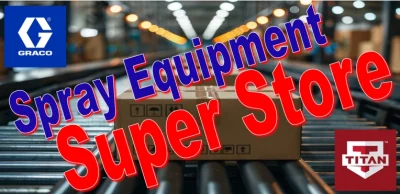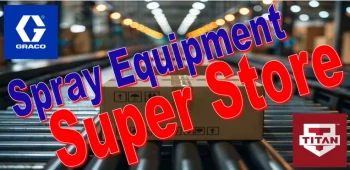Services
We offer a range of services tailored to meet the specific needs of your project!
- Spray-Foam Insulation
- Spray-Foam Roof Treatment
- Blow-In Insulation
- Spray Equipment Warranty Work (customer is responsible for shipping)
- Equipment and Project Planning/Consultation
Wanna do it yourself? Visit our Online Store:
Spray Foam Insulation
Spray foam insulation is a versatile solution that provides superior insulation and air sealing properties compared to traditional insulation methods. Our skilled technicians apply spray foam insulation to your property’s walls, ceilings, floors, and other areas, creating a tight seal that prevents air and moisture infiltration.
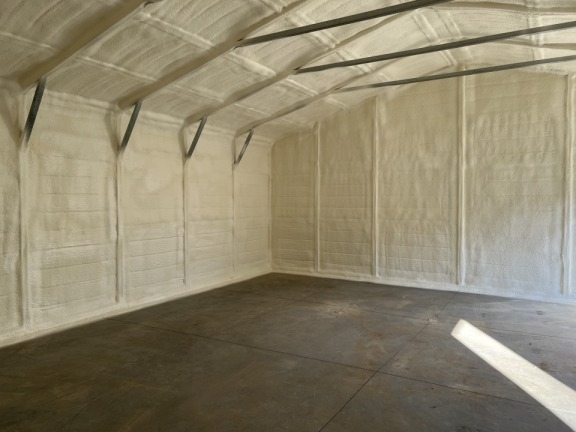
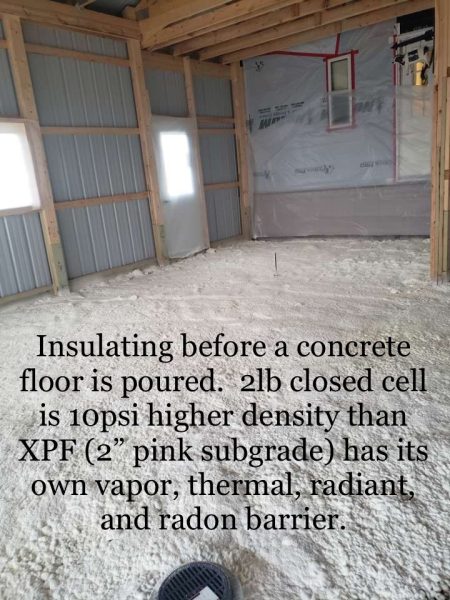
Best Uses:
- Walls
- Ceilings
- Floors
- Attics
- Basements
- Anywhere traditional insulation fails
Advantages:
- Maximum energy savings (up to 40%)
- Enhanced indoor comfort
- Improved indoor air quality
- Superior air sealing properties
- Eco-friendly materials
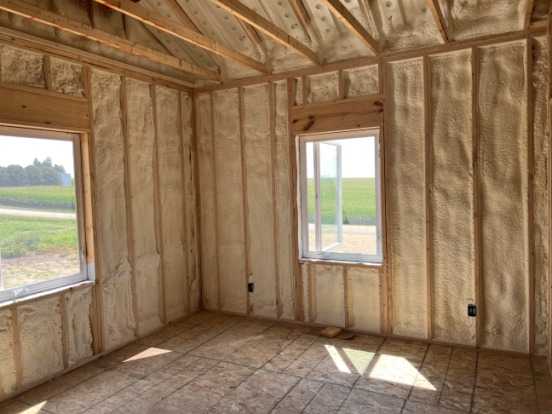
Spray Foam Roof Treatment
Spray Foam provides exceptional waterproofing and insulation properties, offering maximum durability and energy efficiency when used with roofing installations. It forms a continuous barrier that withstands harsh weather conditions, including UV exposure and ponding rain water. Its ease of application and outstanding performance make it the new standard in roofing sustainability.

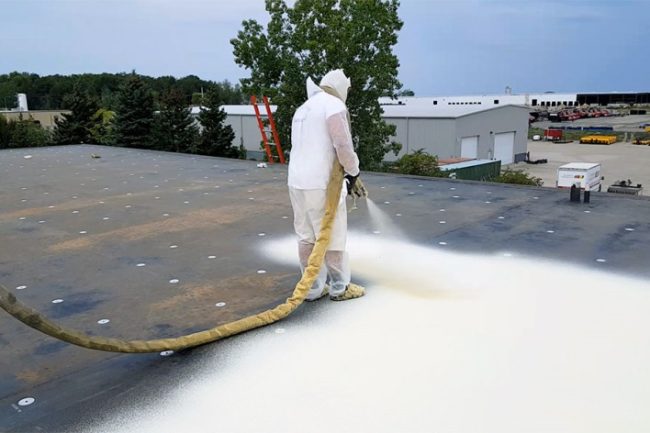
- Best Uses:
- Repairing flat or low-slope roofs
- Waterproofing new or old roof surfaces
- Improving energy efficiency and lowering utility bills
- Advantages:
- Seamless waterproofing
- Thermal insulation barrier
- Durability against weather and harsh elements
- Versatility for different roof types
- Quick and efficient application

Blow-In Insulation
Blow-in insulation is an effective and efficient way to insulate hard-to-reach areas such as small attics and dark crawl spaces. Our specialized machine blows the insulation material into the desired space, creating a seamless and uniform insulation layer.
- Best Uses:
- Small, cramped attic areas
- Dirty and dark crawl spaces
- Hard-to-reach areas where a person can’t fit
- Advantages:
- Reduced heat loss
- Lower utility bills
- Improved indoor comfort
- Eco-friendly options available (cellulose insulation)
- Durable and fire-resistant (fiberglass insulation)
Wanna do it yourself? Visit our Online Store:
Spray Foam vs. Fiberglass - Which is Better?
As a homeowner, business owner, or contractor, choosing the right insulation material for your property is critical. It not only impacts the comfort and energy efficiency of your space but also affects your budget in the long run. The two most popular types of insulation materials available on the market are spray foam insulation and fiberglass insulation. Both offer different benefits and drawbacks, making it difficult to determine which one is better for your needs. In this article, we’ll compare the two insulation materials and help you make an informed decision.
Spray Foam Insulation
Spray foam offers a superior level of insulation compared to traditional insulation materials. When the foam is sprayed onto surfaces, it expands to fill every nook and cranny, providing a complete seal. This means that air can no longer seep through gaps or crevices, which is a common problem with traditional insulation materials like fiberglass. The airtight seal created by spray foam insulation helps to maintain consistent temperatures inside your property, resulting in improved energy efficiency and reduced energy bills.
Another advantage of spray foam is its ability to help control moisture levels inside your property. Spray foam insulation is impermeable to water, which means that it doesn’t absorb moisture like other insulation materials. This is important because moisture can cause mold growth and other moisture-related issues that can be harmful to your health and property. With spray foam insulation, you can protect your property from moisture and ensure that it stays dry and comfortable all year.
Spray foam is also an eco-friendly option. Since it reduces energy consumption, it helps to reduce your carbon footprint and promote sustainability. Additionally, spray foam insulation is made from recycled materials and does not emit any harmful pollutants into the air.
Advantages of spray foam insulation:
- Energy Efficiency: Spray foam is one of the most energy-efficient insulation materials available on the market. It forms an airtight barrier, preventing air leaks and heat loss, resulting in lower energy bills.
- Longevity: Spray foam insulation lasts for a long time and doesn’t require frequent replacement. It’s durable and can withstand harsh weather conditions, making it a cost-effective solution in the long run.
- Improved Air Quality: Spray foam insulation helps improve air quality in your home or business by reducing the entry of allergens and pollutants, resulting in a healthier living environment.
- Versatility: Spray foam insulation can be used in all different areas of your property, including floors, walls, attics, basements, and more, making it a very versatile insulation solution.
Disadvantages of spray foam insulation:
- Cost: Spray foam is more expensive than other insulation materials, making it less accessible to homeowners on a budget.
- Installation: Spray foam requires professional installation, which can be time-consuming and expensive.
- Chemicals: Spray foam is made of chemicals that can emit harmful fumes during installation. However, most spray foam insulation products on the market today are low-VOC and safe for use.
Fiberglass Insulation
Fiberglass insulation has been a popular choice for homeowners and contractors for many years due to its affordability and ease of installation. It is made from glass fibers that are woven together to create a fluffy material that can be easily cut to fit into walls, floors, and ceilings. It comes in batts, rolls, and loose-fill forms, making it a versatile insulation solution for a variety of applications.
One of the advantages of fiberglass insulation is its fire-resistant properties. The glass fibers used in fiberglass insulation are naturally resistant to flames, making it a safer insulation material for your property. Additionally, fiberglass insulation provides excellent sound insulation, reducing the amount of noise that can enter or leave your property.
Fiberglass insulation is also a good choice for those looking for a DIY insulation project. It can be easily installed without the need for professional assistance, which can help save on installation costs. With the proper tools and equipment, homeowners can install fiberglass insulation themselves, making it a cost-effective insulation solution.
However, fiberglass insulation also has its drawbacks. One of the main disadvantages of fiberglass insulation is its lack of energy efficiency. It is not as effective as spray foam insulation in preventing air leaks and maintaining consistent temperatures inside your property. Fiberglass insulation is also prone to moisture absorption, which can lead to mold growth and other moisture-related issues if not properly installed and maintained.
Another disadvantage of fiberglass insulation is its need for maintenance over time. Over time, fiberglass insulation can become compressed or settle, reducing its insulation properties. This means that it may need to be replaced or topped up to maintain its effectiveness over time.
Advantages of fiberglass insulation:
- Cost-Effective: Fiberglass insulation is one of the most cost-effective insulation materials available on the market, making it a popular choice for homeowners on a budget.
- Easy Installation: Fiberglass insulation can be installed as a DIY project, making it a convenient solution for homeowners who prefer to do the work themselves.
- Fire-Resistant: Fiberglass insulation is naturally fire-resistant, making it a safe insulation solution for homes and businesses.
- Soundproofing: Fiberglass insulation helps reduce noise levels inside your property, making it a popular choice for homeowners and business owners looking for soundproofing solutions.
Disadvantages of fiberglass insulation:
- Energy Efficiency: Fiberglass insulation is not as energy-efficient as spray foam insulation. It’s prone to air leaks, which can result in higher energy bills.
- Moisture: Fiberglass insulation absorbs moisture, which can lead to mold growth and other moisture-related issues.
- Maintenance: Fiberglass insulation requires maintenance and replacement over time, making it less cost-effective in the long run.
Spray Foam or Fiberglass?
The decision between spray foam and fiberglass insulation ultimately depends on your specific needs and budget. While spray foam insulation offers better energy efficiency, improved air quality, and longevity, it comes at a higher cost and requires professional installation. On the other hand, fiberglass insulation is a cost-effective solution that can be installed as a DIY project, but it’s less energy-efficient and requires maintenance over time.
If you’re unsure which insulation material to choose, it’s best to consult with a professional insulation contractor. They can assess your property’s specific insulation needs and recommend the best solution that fits your budget.
At Sure Fire Spray Foam, we offer both spray foam and fiberglass insulation solutions. Our experienced and certified professionals can help you determine which insulation material is best for your property and provide professional installation services to ensure optimal performance.
Contact us at (608) 485-0755, or click the ‘Get a Quote’ button to schedule a consultation or request a quote today!
